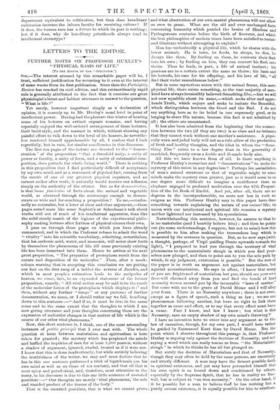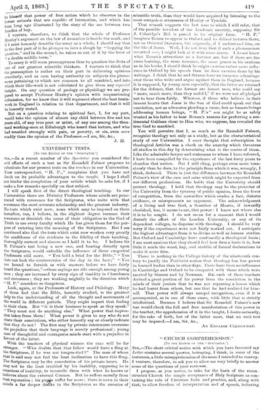LETTERS TO THE EDITOR.
FURTHER NOTES ON PROFESSOR HUXLEY'S "PHYSICAL BASIS OF LIFE."
(To THE EDITOR OF THE "SPECTATOR") SIR,—The interest aroused by this remarkable paper will be, I trust, sufficient justification for recurring to it even at the interval of some weeks from its first publication. Since then the Fortnightly Review has reached its sixth edition, and this extraordinarily rapid sale is generally attributed to the fact that it contains our great physiologist's latest and boldest utterance in answer to the question, "What is life ?"
Yet surely, however important simply as a declaration of opinion, it is scarcely up to Mr. Huxley's usual level in point of intellectual power. Having had the pleasure this winter of hearing some of his lectures on extinct organic remains, and having especially enjoyed the well-ordered arrangement of those lectures, their lucid style, and the manner in which, without showing any painful effort to talk down to the level of his hearers, he nevertheless rendered himself apprehensible by all, I confess that I look regretfully, but in vain, for similar excellencies in this discourse.
The first ten pages of the lecture are devoted to the " demonstration " of the proposition "that a threefold unity, a unity of power or faculty, a unity of form, and a unity of substantial composition, does pervade the whole living world." There is nothing in this proposition that I find particularly difficult of acceptance by my own mind, and as a statetneut of physical fact, coming from the mouth of one of our greatest physical inquirers, and an earnest seeker after truth, it naturally would receive our adhesion simply on the authority of the utterer. But as for demonstration, is that loose fasciculus of facts about the animal and vegetable world, as observed through the microscope enough to, demonstrate so wide and far-reaching a proposition ? To me,—confessedly no naturalist, but a lover of clear and close argument,—these pages sound more like some Sophist's or Schoolman's talk about truths still out of reach of h is intellectual apparatus, than like the solid steady march of the legions of the experimental philosophy making fortress after fortress of physical science their own.
I pass on through those pages on which you have already commented, and in which the Professor refuses to admit the word " vitality " into his scientific vocabulary, admitting, nevertheless, that his carbonic acid, water, and ammonia, will never show forth by themselves the phenomena of life till some previously existing life has been immersed into them. Hence he arrives at his next great proposition, "The properties of protoplasm result from the nature and disposition of its molecules." Then, after a mocksolemn warning that in accepting this conclusion we are putting our feet on the first rung of a ladder the reverse of Jacob's, and which in most people's estimation leads to the antipodes of heaven, we come, first, to an expanded statement of the former proposition, namely, "All vital action may be said to be the result of the molecular forces of the protoplasm which displays it ;" and then, without any further " rungs " or any pretence of further demonstration, we come, or I should rather say we fall, headlong down to this sentence :—" And if so, it must be true in the same sense and to the same extent that the thoughts to which I am now giving utterance and your thoughts concerning them are the expression of molecular changes in that matter of life which is the source of our other vital phenomena."
Now, this short sentence is, I think, one of the most astounding instances of petitio principii that I ever met with. The whole question at issue between materialism and spiritualism is here taken for granted ; the mystery which has perplexed the minds and baffled the inquiries of men for at least 3,000 years is, without a shadow of argument, ignored, evaded, treated as if it were not. I know that this is done inadvertently, but while entirely believing the truthfulness of the writer, we may and must declare that he has in this one sentence performed a trick of legerdemain (on his own mind as well as on those of his readers), and that all that is most spicy and paradoxical, and, therefore, most attractive to the many, in his discourse is due to this one little sentence of unstated postulate :—" Our thoughts are merely vital phenomena,' the sole and unaided product of the tissues of the body."
That is the unstated postulate, that is what we cannot prove
and what observation of our own mental phenomena will not allow us ever to grant. What are the old and ever unchanged facts concerning humanity which puzzled the brains of Hindoos and Pythagoreans centuries before the birth of Socrates, and which the best philosophies of modern times have been satisfied to restate and illustrate without attempting to explain?
Man has undoubtedly a physical life, which he shares with the lower animals. He is born, he feeds, he sleeps, he dies, be decays like them. By feeding on them, he converts their flesh into his own ; by feeding on him, they can convert his flesh into theirs. Thus he leads, in part, a life of animal instinct; his passions are to a certain extent the same as theirs ; his lusts and his hatreds, his care for his offspring, and his love of life, "all find their ruder resemblances below."
But in some mysterious union with this animal frame, this mere physical life, there exists something, as the vast majority of mankind have always irresistibly believed Something Else,—but we will not now squabble about its name,—which seeks after and apprehends Truth, which enjoys and seeks to imitate the Beautiful, which distinguishes between the Good and the Bad. I do not say anything here as to its belief in one supremely good, or its longing to share His nature, because this fact is not admitted by all ; the others are uncontested.
It has also been admitted from the beginning that the connection between the two (if they are two) is so close and so intimate that they cannot work without one another's assistance. A physically worn and jaded body will not as a rule allow of the production of fresh and healthy thoughts, and the idiot in whom the "Something Else" exists to a less degree than in the generality of mankind, frequently owns a feeble and ill-made body also.
All this we have known from of old. Is there anything in Professor Huxley's researches and " demonstrations " to make the mystery of this union in any degree less ? Perhaps his assimilation of man's animal structure to that of vegetable might to some minds make the mystery even greater, just as it would seem to us one degree more difficult to imagine a cauliflower than an elephant engaged in profound meditation over the 47th Proposition of the 1st Book of Euclid. And yet, after all, there are no degrees in the incomprehensible, no more nor less in such an enigma as this. Professor Huxley may in this paper have done something towards explaining the nature of our animal life; its union with our intellectual and spiritual life remains a mystery neither lightened nor increased by his speculations.
Notwithstanding this sentence, however, he assures us that he is no materialist (and I heartily believe him) ; and then he points out (to some understandings, I suppose, but not to mine) how this is possible to him after making the tremendous leap which is measured by the sentence in question. But, as he now says (with a thought, perhaps, of Virgil guiding Dante upwards towards the light), "I purposed to lead you through the territory of vital phenomena to the materialistic slough in which you find yourselves now plunged, and then to point out to you the sole path by which, in my judgment, extrication is possible." But the rest of the paper is in truth an argument not against materialism, but against necessitarianism. He says in effect, know that many of you are frightened of materialism lest you, should see your own free-will charmed away from you and find the bonds of hard necessity woven around you by the inexorable "laws of matter." But come with me to the grave of David Hume and I will allay your fears. There is no Necessity anywhere ; there is not even, except as a figure of speech, such a thing as law ; we see one phenomenon following another, but have no right to link them together as cause and effect, or to say that every effect must have a cause. Fact I know, and law I know ; but what is this Necessity, save an empty shadow of my own mind's throwing?'
I have no intention here to enter into any argument as to the law of causation, though, for my own part, I would here rather be guided by Emmanuel Kant than by David Hume. But the point which I observe throughout this passage is, that Professor Huxley is arguing only against the doctrine of Necessity, and not saying a word which can really rescue us from "the Materialistic slough" in which he thinks he has all but plunged us.
But surely the doctrine of Materialism and that of Necessity, though they may often be held by the same persons, are essentially and utterly different. A man may have the firmest possible faith in spiritual existences, and yet may have persuaded himself that his own spirit is so bound down and conditioned by others, especially by the Supreme Spirit, that he has in reality no free.will, but is subject to "an iron necessity." On the other hand, if it be possible for a man to believe that he has nothing but a purely animal existence, it is equally possible for him to attribute
himself that power of free action which he observes in the lowest animals that are capable of locomotion, and which has been long ago illustrated by the story of the ass between two bundles of hay.
I venture, therefore, to think that the whole of Professor Huxley's argument on the law of causation is beside the mark, and if 1 must honestly describe the essay as a whole, I should say that in the first part of it he plunges us into a slough by "begging the question," and in the second, he raises us out of it by the lever of "a double middle term."
To many it will seem presumptuous thus to question the dicta of one of our greatest scientific thinkers. I venture to think that the presumption is rather on their part in delivering opinions oracularly, and as men having authority on subjects the phenomena pertaining to which are common to all mankind, and into which their life-work is not calculated to give them any especial insight. On any question of geology or physiology we are prepared to accept Professor Huxley's opinion with unquestioning submission, for we know that it will represent about the best brainwork in England in relation to that department, and that it will be honestly stated.
But on a question relating to spiritual fact, I, for my part, would take the opinion of almost any child between five and ten years old, of any true poet or artist, of any one among the thousand working-men at Edinburgh who heard that lecture, and who had wrestled strongly with pain, or poverty, or sin, even more readily than the opinion of the Professor.—I am, Sir, &c., J. 11.



































 Previous page
Previous page